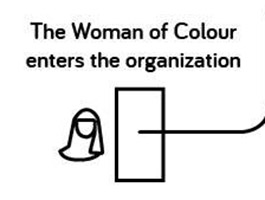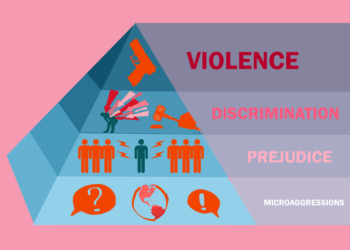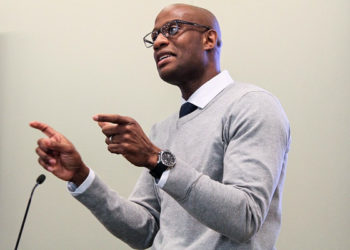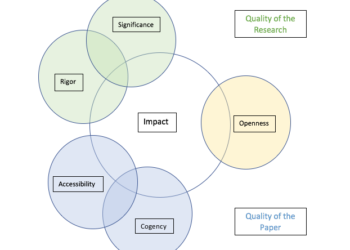Editor’s Note: Today’s post is by Gisela Concepción Fosado and Cathy Rimer-Surles. Gisela is an editor at Duke University Press, publishing books across the humanities and social sciences, with a particular interest in books that foreground marginalized perspectives, adopt an intersectional approach, and contribute to our understanding of social movements and inequality. Cathy is a lawyer/librarian, and she serves as the Assistant Director for Contracts and Intellectual Property at Duke University Press. Together, they co-founded the Equity and Inclusion Interest Group at Duke University Press.
Over the past few years, there has been a growing awareness about what it means to have an industry that is, by one estimate, over 90% white. Publishing professionals are asking important questions, such as, “what types of systems are in place that exclude some and not others?” and, “what is it like for a person of color to navigate these white spaces?” At Duke University Press, we founded a grassroots Equity and Inclusion Interest Group three years ago. Twenty-five staff members came together during our first impromptu meeting in 2016. Since that time, our group has hosted numerous equity-themed training sessions, book studies, film showings, and many other conversations designed to help staff work together in making change within our own personal lives, our organization, and our wider industry.
Inspired by that collaborative work, many of us at Duke University Press have become involved in industry-wide projects, such as the Society for Scholarly Publishing (SSP) Diversity, Equity, and Inclusion Committee (originally the Diversity and Inclusion Task Force), NASIG’s Equity and Inclusion Committee, the Association of University Presses (AUPresses) Diversity and Inclusion Task Force, and the AUPresses Gender Equity and Cultures of Respect Task Force., as well as working to develop anti-racism toolkits for organizations, allies, and people of color through the Triangle Scholarly Communications Institute this fall. Duke University Press was also among the first presses to participate in the Mellon University Press Diversity Fellowship program and benefited from the leadership and ideas from the three Fellows from that program. To be clear, our Press has just as much work to do as other university presses in the area of equity, but we’re thrilled to be among colleagues who have realized the importance of this work within our industry.
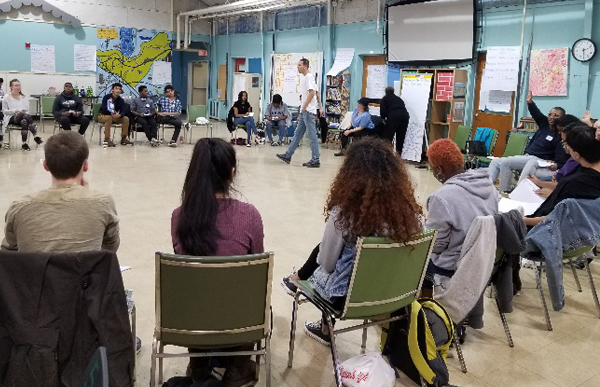
Like SSP, AUPresses has made a welcome effort to foreground discussions on equity and inclusion over the past few years and we were delighted to see momentum build even further this year. When AUPresses Program Committee Member, Laurie Matheson (Director, Illinois University Press) contacted us last year about facilitating a panel on equity for the 2019 AUPresses Annual Meeting, we were honored to contribute our voices to this crucial and long-overdue conversation in scholarly publishing.
We wanted our panel to be framed by the experiences of people of color in our industry and also grounded in the sustained and dedicated work of white allies. We immediately thought of the groundbreaking work of Melanie S. Morrison, a Duke University Press author who is founder and executive director of Allies for Change, an organization composed of “a network of anti-oppression educators who share a passion for social justice and a commitment to creating and sustaining life-giving ally relationships and communities.”
Our panel opened with Gisela sharing numerous compelling personal stories she had gathered through focus groups with people of color in publishing, along with qualitative data gathered through a survey. Cathy followed, providing key strategies for shifting the framework of conversations and initiatives from “diversity” to “equity” and anti-racism while Melanie offered both insights and the crucial elements required for lasting transformational change in organizations.
We hope you’ll view the video recording of our panel discussion.
We also wanted to share recommendations from the people of color who participated in Gisela’s survey, as well as from Melanie, based on her years of experience working with organizations.
Recommendations from people of color in our industry:
- Listen to your colleagues of color and do not deny or downplay their experiences with racism.
- If there are diversity initiatives, show interest in them (especially if they are led by people of color); if there are no diversity initiatives, be the one to start one (don’t wait for a person of color to do that, or expect a person of color to do it).
- Check in with the people of color on your team to ask if there’s anything you can be doing to support them. Create an environment of trust by consistently asking them for feedback around what kind of support they need (because being one of few people of color working in publishing requires emotional support and not just professional support).
- Don’t pretend to be color-blind or assume race isn’t always impacting their lives. It’s okay to admit that the same thing impacts people of different racial identities differently.
- Think through what is considered “professionalism” at your office and how that ties to white supremacist culture.
- When speaking about diversity and the need for more, do not make comments that suggest it would only come at the expense of “higher quality” candidates.
- Make sure you listen to people of color and make sure you aren’t holding them to higher standards than other workers.
- Make sure you are considering people of color for opportunities that arise.
- Make sure people of color are in the room when decisions are being made.
- Consider attending bystander intervention trainings (like those offered here and here).
Melanie’s recommendations for white people who strive to be allies in the work of racial equity:
- Become conscious of the unearned privileges granted white people.
- Interrupt the habits, policies, and practices that protect white privilege.
- Work through shame and guilt.
- Take action to interrupt racism at the personal, interpersonal, institutional, and cultural levels.
- Hear the anger and grief that people of color express about racism without judging or policing their feelings.
- Move out of social segregation.
- Cultivate a spirit of cultural humility.
- Develop truth-telling relationships of accountability with people of color and other white people.
- Stay on the journey, engaged in the struggle for racial justice, for a lifetime.
We welcome your comments and questions and hope you’ll join the movement toward equity within our industry and beyond.
Selected Racial Equity Training Organizations
- Allies for Change
- Crossroads Antiracism Organizing and Training
- ERACCE – Eliminating Racism & Creating/Celebrating Equity
- Frances Kendall
- Hackman Consulting Group
- National Coalition Building Institute
- People’s Institute for Survival and Beyond
- REI – Racial Equity Institute
- The Truth & Titus Collective
- Visions, Inc
- World Trust
Discussion
3 Thoughts on "Guest Post — Equity is Possible: Forging Paths toward Equity and Anti-Racism in Scholarly Publishing"
This post is foundationally critical for effecting change in publishing. Thank you for your work. #sharing
Bravo for this good work and for magnificent publishing at Duke. As a bookseller in Berkeley who has always admired DUP, I am happy to observe that books and authors who write about ethnic subjects, including equity, anti-racism, and the deep history of people of color are among our best selling and attended author events.
It’s bracing and wonderful to be a part of such books and movements. This year at UPB/Berkeley, we have enjoyed the rich stimulation of the Ohlone Food and Culture Project, manifested in the the Ohlone Cafe run by two local Ohlone Indians, a celebrated this week in the New York Times:
https://www.nytimes.com/2019/08/12/dining/cafe-ohlone-review-berkeley.html
Any post that has action items involved is a winning article to me. I’m very interested in the anti-racism toolkit and I’m pleased to see that allyship is mentioned. Thank you Gisela and Cathy for writing this post letting us all know of the great work being done at DUP.
